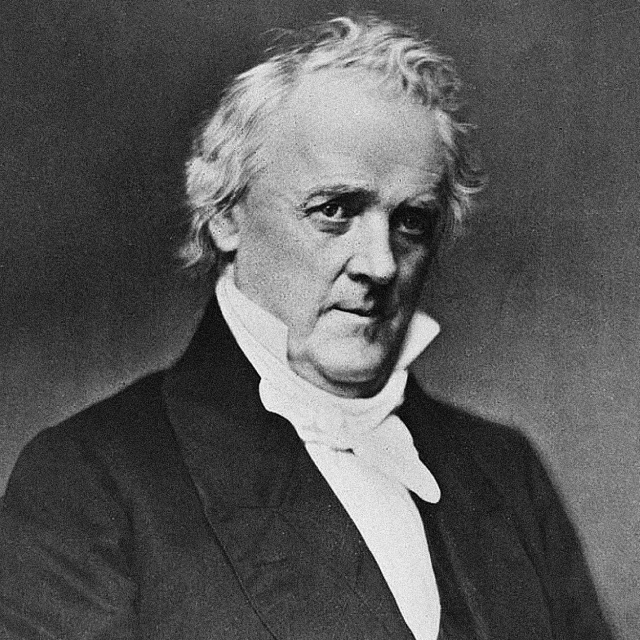
Brief Summary of Presidency
James Buchanan served as the 15th President of the United States from 1857 to 1861. Although Buchanan spent his presidency trying to maintain peace between abolitionist and pro-slavery groups, he could only do so much. Just one month after he completed his presidency, the American Civil war began. Unfortunately, Buchanan is notorious as the worst president to hold office in the United States.
Early Career
James Buchanan was born on April 23, 1791, in Cap Grove, Pennsylvania, to James Buchanan Sr. and Elizabeth Speer Buchanan. After graduating from Dickinson College in Carlisle, Pennsylvania, Buchanan went on to study law and eventually opened his own practice in Lancaster, Pennsylvania. Because Buchanan never married, his niece, Harriet Lane, took on the social responsibilities of first lady during his presidency.
From 1814 to 1816, Buchanan began his political career as a federalist member of the Pennsylvania Legislature. Four years later, Buchanan was elected to the U.S. House of Representatives, where he served for 12 years. As the Federalist Party neared its end, Buchanan became more aligned with the Democratic Party. In 1831, President Andrew Jackson appointed Buchanan as the U.S. ambassador in Russia. After returning from Russia, Buchanan was elected by Pennsylvania to the United States Senate. In 1845, after being named U.S. Secretary of State by President James Polk, Buchanan resigned from the Senate and assumed this new role. From 1845 to 1849, the nation grew by more than one third: Texas was annexed, California and a great deal of the present-day Southwest were acquired, and boundary-disputes with Great Britain about the Oregon territory were officially settled.
Inevitably, tension arose with the acquisition of new territory, namely, whether such territory would or would not allow slavery. At the time, the moral issues associated with slavery were beginning to come to light, making the issue intensely divisive across the Nation. Buchanan, who felt that slavery was morally apprehensible but also a constitutional right, sided with Southerners and blocked the Wilmot Proviso, which would have halted slavery from extending to any territory acquired from Mexico. Buchanan later supported a series of congressional acts, collectively titled Compromise of 1850, that would maintain California’s status as a free state while allowing new western territories to decide whether they would be free or slave states before applying for statehood. This new framework would be called popular sovereignty. In 1853, President Pierce appointed Buchanan as minister of Great Britain, and as such, he drafted a plan for the United States to acquire Cuba from Spain.
After President Pierce signed the Kansas-Nebraska Act, a move that was politically harmful, the democratic party decided against his re-nomination and replaced him with Buchanan. During his campaign, Buchanan reiterated that the issue of slavery was to be decided on the state/territory level, while the Republican nominee, John Freemont, maintained that slavery should be federally banned across the union. Buchanan received more than 45 percent of the total ballots, making him victorious over his two opponents.
Presidential Tenure
As president, Buchanan appointed both Northerners and Southerners to his cabinet hoping that this would “keep the peace” between the two groups. Instead of fulfilling this purpose, tension between the groups was heightened. Just two days after he was sworn in, the Supreme Court heard the Dred Scott case. Consequently, slavery was no longer regulated by the federal government and African Americans were denied citizenship rights. Buchanan used his influence to pressure a Northern justice into joining the Southern majority, believing that the ruling would resolve tensions in the United States. Instead, the decision further divided the nation and, to many, proved that Buchanan favored the south.
During his presidency, Buchanan supported the Lecompton Constitution, which would have allowed Kansas to become a slave state. Evidently, this frustrated Northerners even more. In 1858, northern Republicans won a plurality in Congress, thus allowing them to halt a great deal of Buchanan’s presidential agenda. In response, Buchanan exercised his veto power against Republican legislation.
As promised in his inaugural address, Buchanan did not seek reelection. He was succeeded by Republican president, Abraham Lincoln. Just a few months after his time in office, the Civil War began. Buchanan supported Lincoln and the Union throughout the war and passed on June 1, 1868.








